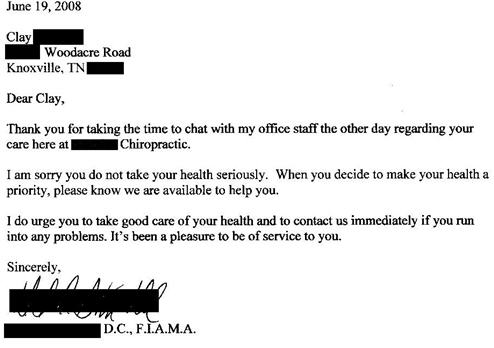Nick suffers from back pain and thought he’d seek chiropractor care for some pain relief. What he got in return was the sting of a nasty hospital bill because his insurance wouldn’t pay for his x-rays, even though the nurse and doctor assured him the scans would be covered.
healthcare

../../../..//2009/06/10/no-health-insurance-the-emergency/
No health insurance? The emergency room usually shouldn’t be your first stop. Here’s where you should go for help.

Going To The Doc? Be Sure You Don't Sign A Gag Order
Man, those online review websites sure can be harsh. Some doctors think they’re totally unfair! That’s why a neurosurgeon in North Carolina has started a business called Medical Justice. The Associated Press says the company provides waiver forms for docs to give to patients. If you sign it, and then post a review online that can be traced back to you, the doctor can use your signed form as proof that it must be removed.

Seven States Sue Over Health Worker "Conscience" Rule
Seven state attorneys general, Planned Parenthood, and the ACLU have sued to overturn the so-called “conscience” rule, which allows doctors, pharmacists, and other health care workers to refuse to perform procedures or dispense medication that conflicts with their beliefs.

FDA Considers Banning OTC Cough Medicines For All Children Under 6
Pediatricians are asking the FDA to recall all OTC cough medicines for children under six years old, and the FDA is holding a public hearing on the subject today. One reason this has only recently become an issue is that when the FDA originally set rules for OTC cough medicines, they were based only on studies for adults, not kids, writes the Associated Press. Although there’s a low risk of unintentional overdose—the AP says about 7,000 children are admitted to ERs each year—the other issue is that there’s very little evidence that they’re effective.

Aetna: Instead Of Approving That $113,000 Life-Saving Brain Operation, We're Going To Cancel Your Coverage. Sorry!
Meet 19-year-old Caitlin Jackson. Caitlin was recently diagnosed with Chiari Malformation, a potentially fatal brain disorder that interferes with motor control and memory. Immediate brain surgery is Caitlin’s only treatment option, but her insurance company, Aetna, took its sweet time approving her operation, and then reversed itself claiming her benefits had expired.

This Rejected Chiropractor Is "Sorry You Don't Take Your Health Seriously"
The excellent blog, Passive Aggressive Notes has a submission from a reader who rejected his chiropractor. Clay decided not to go back after the doctor refused to show him his x-rays unless Clay attended a seminar about payment plans and treatment options. A few days later he got a note that said:

HCA: It's Hospital Policy To Shakedown Patients Before They Leave
Among the many hospital personnel who stopped in to see my father after surgery was a “financial counselor” from the billing office, who basically started stalking him from the minute he left the intensive care unit.

How To Avoid The Medicare Donut Hole
Anyone who has Medicare and takes lots of drugs or a few very expensive ones (or who has an older relative who does) knows about the dreaded “donut hole”—the gap in coverage that happens each year if you have to spend a lot of money on prescriptions. If you’re above the poverty level but don’t have good gap insurance, it can be financially devastating. The New York Times notes that for a quarter of at-risk patients, planning ahead with generics may help you skirt the donut hole altogether. The big stumbling block is that you have to be prepared to discuss your personal finances with your doctor.

Doctors Say Too Many Patients Can't Name The Drugs They Take
Too many patients don’t remember the names of the medications they’re on, posing problems for doctors who are trying to treat them, warn researchers at Northwestern University’s Feinberg School of Medicine in Chicago. About 40% of the patients surveyed “could not accurately recall what drugs they were taking,” and among those with “low health literacy,” the rate jumped to 60%.

Investment Firms Make Retirement Homes Profitable By Making Them Hell Holes
If you wanna make an omelet, you gotta break a few eggs—even if those eggs are old people who die from bedsores that have become infected. The Centers for Medicare and Medicaid Services say that on average, patients at nursing homes that are bought by private investment firms do worse than those at other nursing homes, with higher rates of depression, increased loss of mobility, and less ability to dress and bathe themselves. The New York Times has a horror story on 48 Florida nursing homes where staff was reduced to levels below mandatory requirements and didn’t repair equipment or keep facilities sanitary. Even senior activities were reduced. And there are thousands of (now profitable) nursing homes across the country that are owned by private investment companies.

Massachusetts Makes Health Insurance Mandatory
Massachusetts is “experimenting” with mandatory health insurance, according to the Dr. Judy Ann Bigby, the commonwealth’s secretary of Health and Human Services. Under a new law that went into effect July 1, Massachusetts citizens are required to obtain health insurance or face a penalty. NPR has an interview with Dr. Bigby where she explains the experimental nature of the project and its stated goals.

Hospitals: Staph Infections Are Rampant
The Chicago Tribune reports that 1.2 million hospital patients are infected with dangerous drug-resistant staph infections every year—10 times more than previously estimated according to a new study. The paper also reported that 48,000 to 119,000 hospital patients a year may be dying from methicillin-resistant staphylococcus aureus (MRSA) infections, far more than previously thought. Great!
The Tribune obtained the results during the weekend from the Association for Professionals in Infection Control & Epidemiology (APIC), which is releasing the report publicly on Monday. The author is Dr. William Jarvis, former acting director of the hospital infections program at the Centers for Disease Control and Prevention.

American Medical Association Goes After Walmart-Style Retail Clinics
The American Medical Association is going after in-store clinics being opened by retail giants such as Walmart and Walgreens, according to the Chicago Tribune. The AMA is concerned about potential conflicts of interest between the nurse-practitioners who prescribe the drugs and the pharmacists who fill them.
“Our primary focus is patient safety and patient care, and the retail clinics have a different mission of selling products and prescriptions,” said Dr. Rodney Osborn, a Peoria anesthesiologist who is president of the Illinois State Medical Society, an AMA delegation among the most outspoken on scrutiny of retail clinics. “We want these clinics to be accountable.”
The AMA says it will advocate for increased regulation of the retail clinics. The clinics usually operate 7 days a week and do not require an appointment. There is usually no doctor on site. Patients are charged about $60, even without health insurance. Some clinics waive a patient’s copay, in a move that doctor’s say encourages consumers to avoid seeing a physician.

How To Choose A Doctor
Finding the perfect doctor doesn’t need to be a daunting task, according to five doctors interviewed by New York Magazine. Like kids to an ice cream truck, the best doctors flow to the best hospitals. When in doubt, look for your local teaching hospital. If you have a particular malady that calls for a specialist, check the hospital department’s website for a list of potential doctors and start checking credentials. Referrals from friends and colleagues can also help, especially when it’s time to make an appointment.
It’s all about who referred you. If you don’t have someone who referred you to them, then you’re sort of in the general pool with everybody else. The second most important factor is what insurance you have. Doctors will pick.
How did you find your doctor? Tell us in the comments. — CAREY GREENBERG-BERGER
Save On Meds With A Simple Question
Pay less for drugs by asking your doctor if there’s an older pill that works the same.



